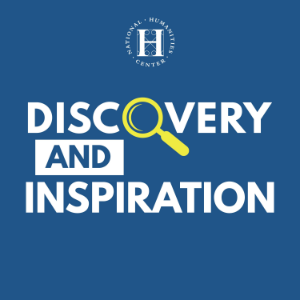
Discovery & Inspiration
Arts & Culture Podcasts
Discovery & Inspiration asks “What can we learn by talking to scholars about their research? What makes them so passionate about the subjects they study? What is it like to make a new discovery? To answer a confounding question?” For over 40 years the National Humanities Center has been a home away from home for scholars from around the world—historians and philosophers, scholars of literature and music and art and dozens of other fields. Join us as we sit down with scholars to discuss their work—to better understand the questions that intrigue and perplex them, the passion that drives them, and how their scholarship may change the ways we think about the world around us.
Location:
United States
Genres:
Arts & Culture Podcasts
Description:
Discovery & Inspiration asks “What can we learn by talking to scholars about their research? What makes them so passionate about the subjects they study? What is it like to make a new discovery? To answer a confounding question?” For over 40 years the National Humanities Center has been a home away from home for scholars from around the world—historians and philosophers, scholars of literature and music and art and dozens of other fields. Join us as we sit down with scholars to discuss their work—to better understand the questions that intrigue and perplex them, the passion that drives them, and how their scholarship may change the ways we think about the world around us.
Language:
English
Between People and a Place: Cindy Decker
Duration:00:30:54
Between People and a Place: Jim Hightower
Duration:00:41:05
Between People and a Place: Michael Wallis
Duration:00:43:51
Between People and a Place: Jeff Stava
Duration:00:29:24
Between People and a Place: Chuck Hoskin Jr.
Duration:00:43:33
Between People and a Place: Onikah Asamoa-Caesar
Duration:00:48:16
Bill Leuchtenburg: NHC Board of Trustees Keynote Address, June 8, 2016
Duration:00:45:44
Elena Machado Sáez, “Activism and Resistance in Contemporary Latinx Theater”
Duration:00:22:06
Gregg Hecimovich, “The Zealy Daguerreotypes: Confronting Images of Enslavement”
Duration:00:21:24
Naomi André, “A History of Blackness in Opera”
Duration:00:19:12
Brian Lewis, “George Cecil Ives and the Transformation of Discourses on Sexuality”
Duration:00:25:06
Jontyle Robinson, “Curating Change: ‘Bearing Witness’ and Legacy of African American Women Artists”
Duration:00:22:52
W. Jason Miller, “Nina Simone and Langston Hughes: Collaborators Across Genres”
Duration:00:19:40
Nancy F. Cott, “Accidental Internationalists: American Journalists Abroad Between the World Wars”
Duration:00:43:18
Paul S. Sutter, “Public Health and the Panama Canal”
Duration:00:27:40
Paul Ushang Ugor, “Socially Responsible Cinema: Femi Odugbemi’s Artistic Vision”
Duration:00:25:25
Maggie M. Cao, “Imperial Painting: Nineteenth-Century Art and the Making of American Empire”
Duration:00:21:45
Howard Chiang, “Psychoanalysis in China”
Duration:00:22:32
Elizabeth S. Manley, “Imagining the Tropics: Women and Tourism in the Caribbean”
Duration:00:24:35
Tony Frazier, “Slavery, English Law, and Abolition in the Eighteenth Century”
Duration:00:14:25